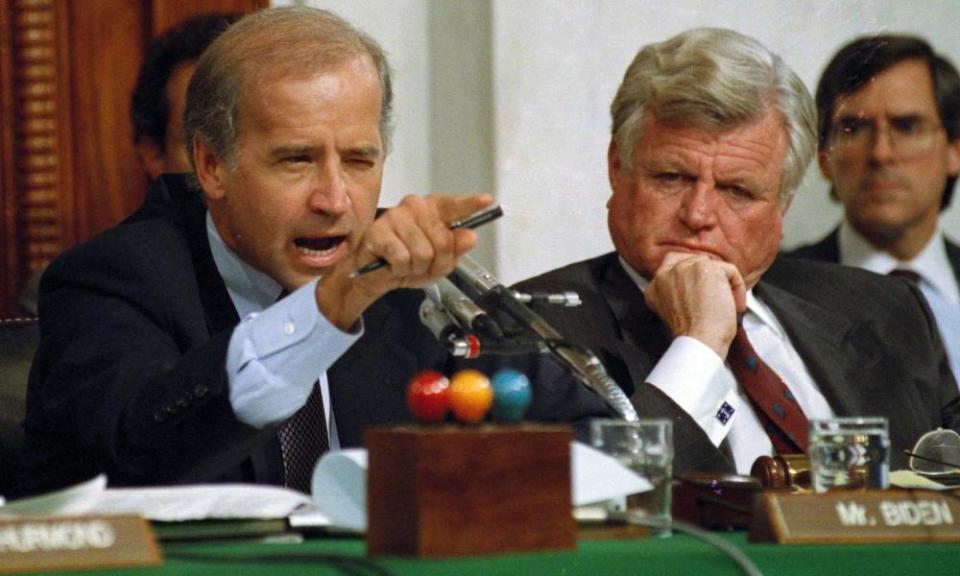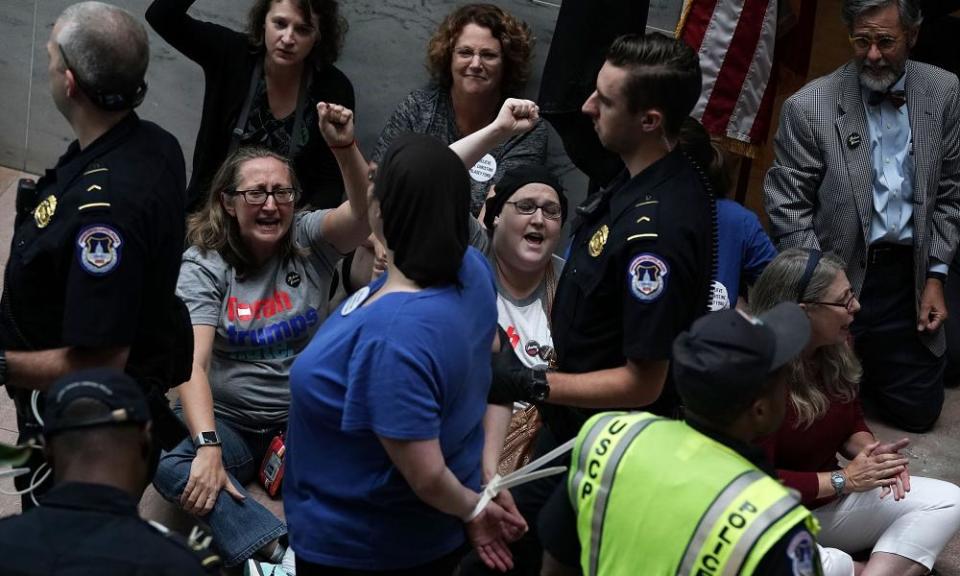Anita Hill and the Senate ‘sham trial’ that echoes down to Kavanaugh

America held up a mirror and did not like what it saw: a lone black woman opposite a row of 14 white men. The law professor Anita Hill was at the Capitol in Washington to describe allegations of sexual harassment against Clarence Thomas, a nominee for the supreme court. But to women in the room, it was Hill who was in the dock.
“It felt like a sham trial,” recalls Judith Lichtman, a leading women’s rights campaigner. “There was the racial impact of a black woman being interrogated by all these white men. The visual was starkly misogynist and you couldn’t escape that.”
Nearly three decades later, the ghost of Hill returned to Capitol Hill this week as Donald Trump’s supreme court nominee Brett Kavanaugh faced allegations of sexual assault. The frenzied tug-of-war over whether testimony should be heard from the judge and his accuser, the California psychology professor Christine Blasey Ford, has exposed how much has changed in American politics and society over the past 27 years, and how much has stayed the same. It has also provided an abrupt, unexpected litmus test of the #MeToo movement.
Thomas, who like Hill is African American, denied her claims of unwanted advances and lewd remarks, dismissed the hearing as “a high-tech lynching for uppity blacks” and was confirmed to the nation’s highest court for life. Republicans were widely criticised as too harsh in their questioning of Hill, Democrats were timid in her defence. Joe Biden, then chairman of an all-male Senate judiciary committee, later vice-president, told NBC’s Today show this week he should have done more to protect Hill from “character assassination”.
Lichtman, who was the president of the Women’s Legal Defense Fund, which became the National Partnership for Women & Families, testified against Thomas. She then witnessed Hill face all the trappings of a trial but without any of the legal protections, watched by millions.
It turned into an unfair inquiry into her moral character and it was pretty disgusting
Judith Lichtman
“The tension in the room was very high and the feeling of a being close up to a miscarriage of justice was palpable,” Lichtman, now 78, recalled. “And, indeed, that’s what happened. It turned into an unfair inquiry into her moral character and it was pretty disgusting.
“You had all these white men asking the most intimate questions about matters she said she wasn’t comfortable talking about for the purpose of discrediting her. It was stark. Here’s an accomplished law professor and the entire Republican establishment came to Clarence Thomas’s defence.”
Old boys’ network
Kavanaugh, a Yale-educated conservative whose views on abortion rights alarm liberals, appeared to be coasting to confirmation this week. Then Ford said in an interview published by the Washington Post that in 1982, when she was 15, a drunken 17-year-old Kavanaugh groped her, tried to take off her clothes and put his hand over her mouth when she tried to scream. Kavanaugh insisted in a statement that Ford’s accusation was “completely false”.
This prompted a week of haggling between politicians and lawyers over whether Kavanaugh and Ford should testify in public. The Senate judiciary committee has 11 Republicans, all men – raising the spectre of another embarrassing old boys’ network spectacle – and 10 Democrats, four of whom are women. Republicans, including two veterans of the Thomas hearing, have denied Ford’s request that the FBI should investigate before she testifies. Hill was granted that right.

Lichtman said: “The parallels to today are worse than eerie; they’re quite frightening. Some things have changed but in some ways Dr Ford’s treatment by the Republicans on the judiciary committee is even worse.”
The wider backlash against Ford also invited comparisons. She has received death threats and been forced to relocate. The president’s son, Donald Trump Jr, issued a mocking tweet that likened her allegation of sexual assault to a childhood crush. The Senate judiciary committee chairman Chuck Grassley, who is 85, said dismissively: “I’d hate to ask, have somebody ask me what I did 35 years ago.” In South Carolina, the Republican congressman Ralph Norman joked: “Did y’all hear this latest late-breaking news from the Kavanaugh hearings? [Supreme court justice] Ruth Bader Ginsburg came out that she was groped by Abraham Lincoln.”
Jocelyn Frye, an African American lawyer and senior fellow at the Center for American Progress think tank in Washington, said: “Twenty-seven years later, we have the same phenomenon rearing its head again. The people who have an interest in protecting the status quo and keeping things as they are are attacking the integrity of Dr Ford. It was hard to watch 27 years ago and it’s agonising to watch now. To see many of the lessons that we should have learned in 1991 being ignored is infuriating.”
Dismissing Kavanaugh’s alleged behaviour would be an extension of the impunity granted to men who sexually assault women
Chloe Safier
And yet this is a distinct cultural moment. From Harvey Weinstein to Senator Al Franken, the #MeToo movement has toppled powerful men in politics, media, Hollywood and other domains.
Lichtman said: “The #MeToo movement is an incredible difference. No man today is too big to be held accountable for sexual assault, no matter how rich, no matter how powerful. Dr Ford coming forward is a direct result of #MeToo because she felt it was a civic duty.”
Some commentators, however, argue that #MeToo is in danger of overreach. Kay Hymowitz, a senior fellow at the Manhattan Institute, a conservative thinktank in New York, acknowledged that Ford’s allegation is grave and should be taken seriously.
She added: “A drunken groping is how I would put it. I don’t see that as something that should destroy a person’s future for good. To go through his whole life with this accusation hanging over him strikes me as unfair.
“It doesn’t reflect well on the #MeToo movement. There was a danger in the #MeToo movement of an accusation being merely enough to condemn somebody. ‘Believe all women: a women says something and it has to be true.’ But sometimes women misremember as men do, and sometimes women lie as men do.”
‘Lines you don’t cross’
There has been sharp disagreement over how decades-old allegations involving teenagers and alcohol should be handled. Some hold that, if proven, the allegation against Kavanaugh would be disqualifying for a position as important as the supreme court, where his role would including making decisions that directly affect women’s control over their own bodies.

Chloe Safier, a gender and women’s rights consultant, said: “In the wake of #MeToo, women who report sexual assault are finally being heard and believed – yet we are still making excuses for men’s behaviour. There are some who say they believe Christine Blasey Ford, but that Kavanaugh can’t be held accountable for his actions because he was drunk or he was young. But legally and ethically, regardless of age or sobriety, there are lines you don’t cross.”
She noted recent discourse over men shamed by the first wave of #MeToo already plotting their comebacks. The comedian Louis CK returned to a comedy club last month without offering an apology, the broadcaster Garrison Keillor has scheduled two shows for November (both sold out) and the Canadian broadcaster Jian Ghomeshi wrote a grievance-filled essay in the prestigious New York Review of Books, sparking an uproar that led to the departure of the publication’s editor Ian Buruma.
“Dismissing Kavanaugh’s alleged behaviour would be an extension of the impunity often granted to men who sexually assault women,” Safier added. “We’ve come too far for that.”
There is another, resounding echo of the Thomas drama. Hill was publicly vilified but her courageous testimony was credited with helping spur “the year of the woman”: in 1992, 28 women were elected to the House of Representatives and four to the Senate, more than doubling the total. In the 2018 midterm elections, a record 257 women are running for the House and Senate. A Politico /Morning Consult poll found that Democratic women are more motivated to vote than any other demographic group.
Slowly but surely, Washington is catching up with society at large. In 1991 there were only two women in the 100-member Senate; now there are 23. One is Mazie Hirono, a Democrat from Hawaii. “I just want to say to the men in this country: just shut up and step up,” she told a press conference this week. “Do the right thing, for a change.”

 Yahoo News
Yahoo News 
